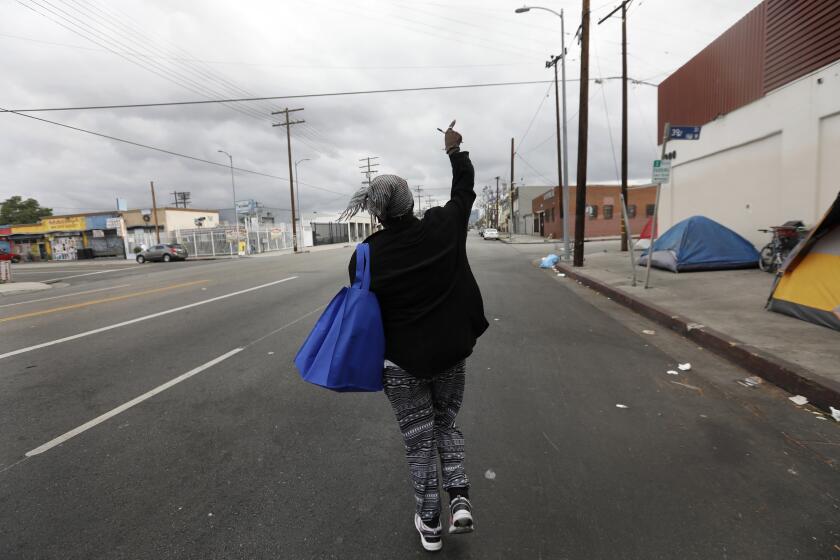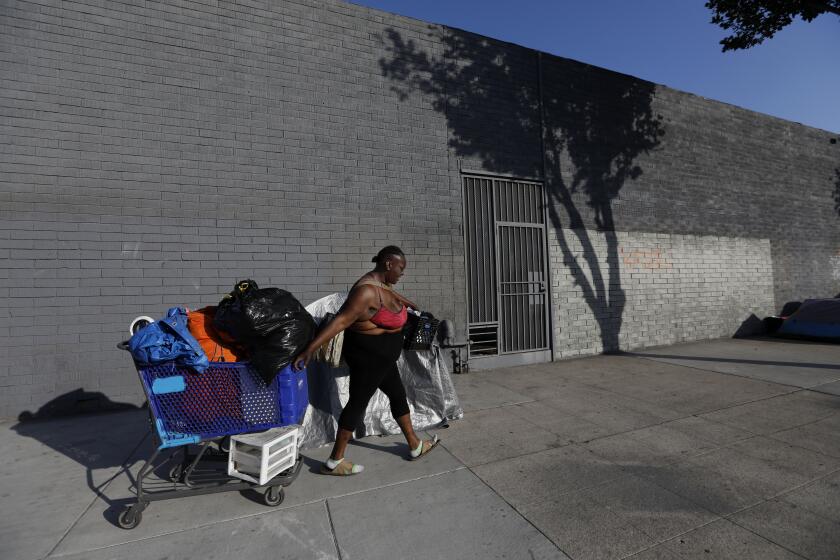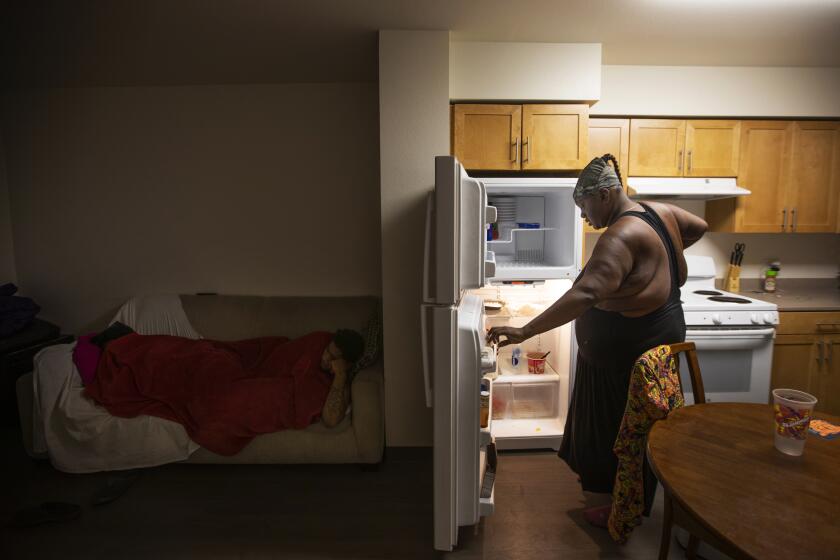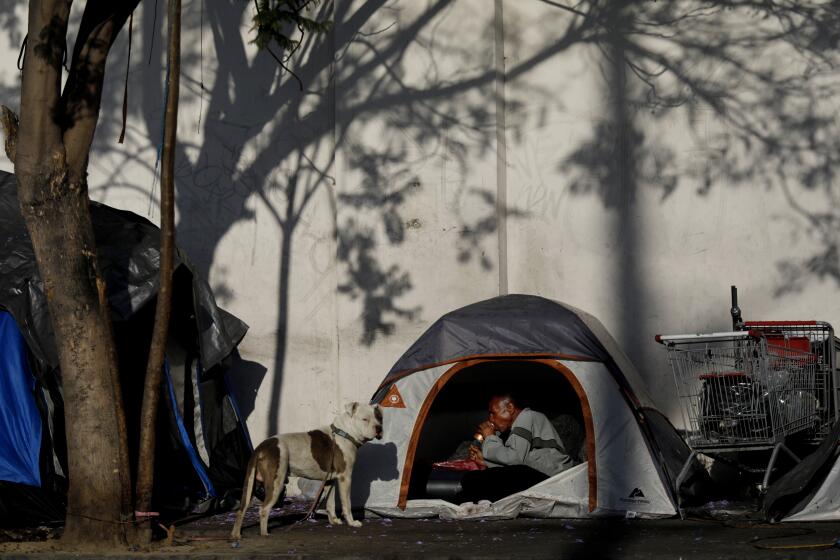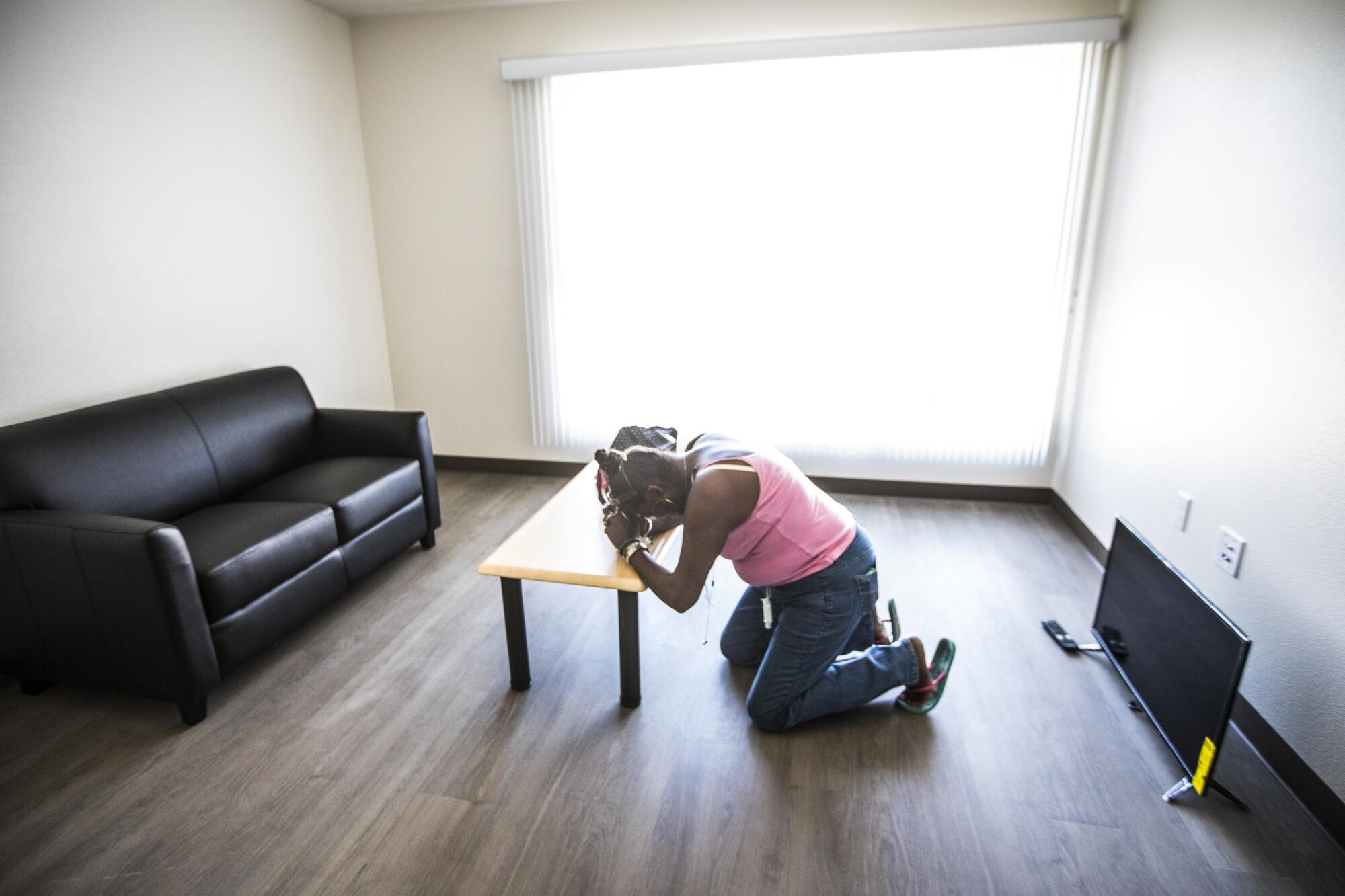
- Share via
On a Friday afternoon in mid-September, Big Mama and Top Shelf stood in wonder and disbelief in the courtyard of the apartment building. They had finally arrived.
“Wow!” Big Mama exclaimed after finding her mailbox.
She took a deep breath, raised her arms and let them fall, her knees slightly buckling. Weeks spent waiting, years spent wondering slipped away.
“I’m speechless right now,” she said, sobbing. She covered her face with a tissue and wept.
Hours earlier, the two women had gotten the phone call they had nearly given up on. Their case manager said they could move in to their apartments. They were stunned and wasted little time.
Laughing and joking together, they hopped on a southbound bus. They couldn’t get away from their tents fast enough. Ahead lay their new homes with hot water, bathrooms and kitchens full of appliances.
Big Mama, 51, had been living on that sidewalk for nine years. She and Top Shelf, 46, were friends and neighbors, looking out for each other on the street.
Both women had been told months earlier that city and county agencies were trying to clear out encampments in the neighborhoods around Broadway Place and Leimert Park. They thought they would be moving in June. Some of their neighbors had gotten their units in August.
But their housing subsidies were delayed by a building inspection. Now with the summer almost over, their time had come.
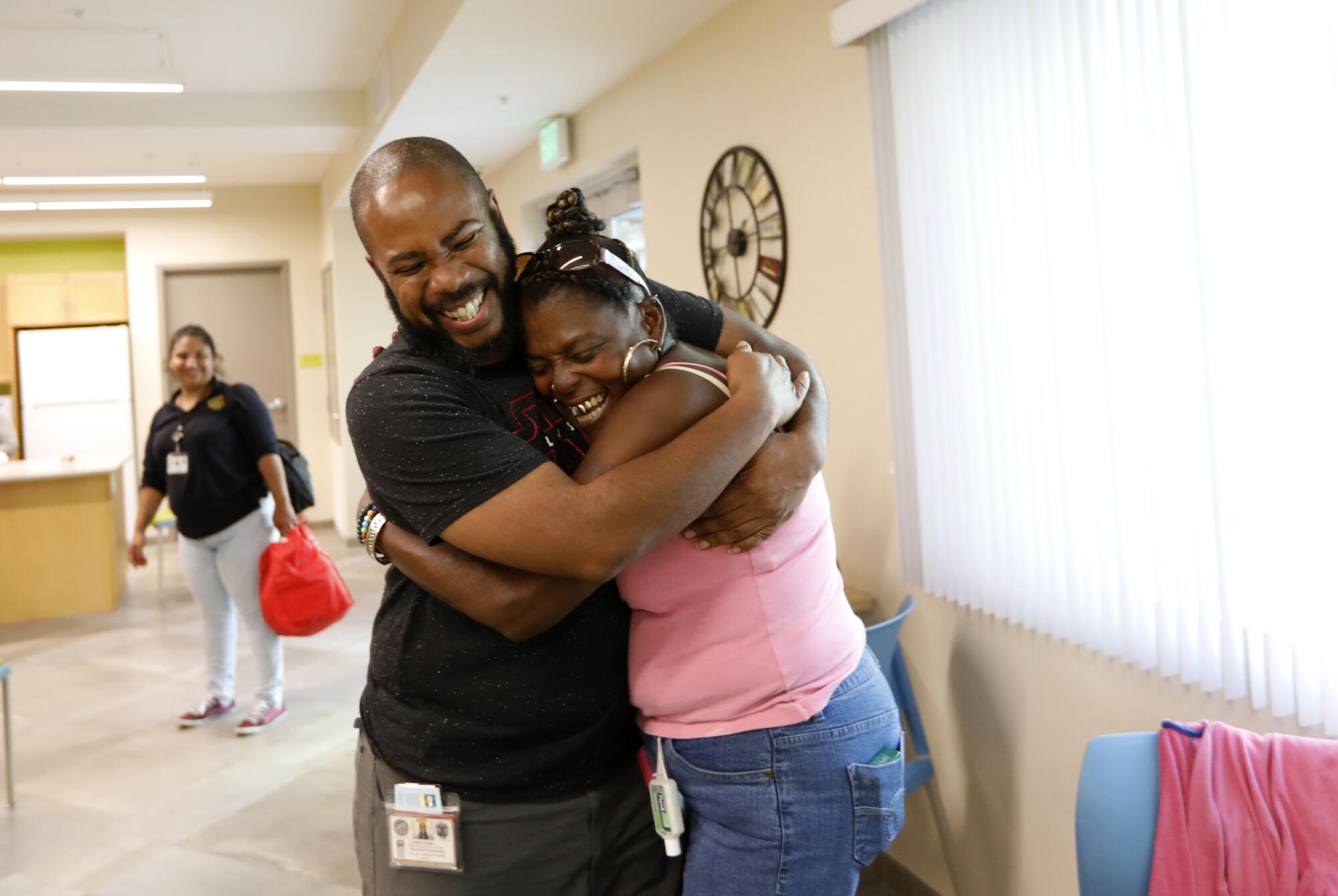
At 2 p.m., Big Mama and Top Shelf met with property management and opened their “Welcome Home” packets.
Keys in hand, they dabbed their eyes and danced.
In the courtyard, they gazed up at their new apartment building.
They went to Top Shelf’s unit first. It was cool and dark. Steel chairs were pulled up to the kitchen table.
“It’s cute,” she said.
She opened every door: bathroom, refrigerator and closet.
Even as Top Shelf seemed uncertain — as if this were too good to be true — she nodded. “This will work out just fine.”
Big Mama’s unit was next.
“Hold the elevator,” she called out, touching her eyes with a tissue.
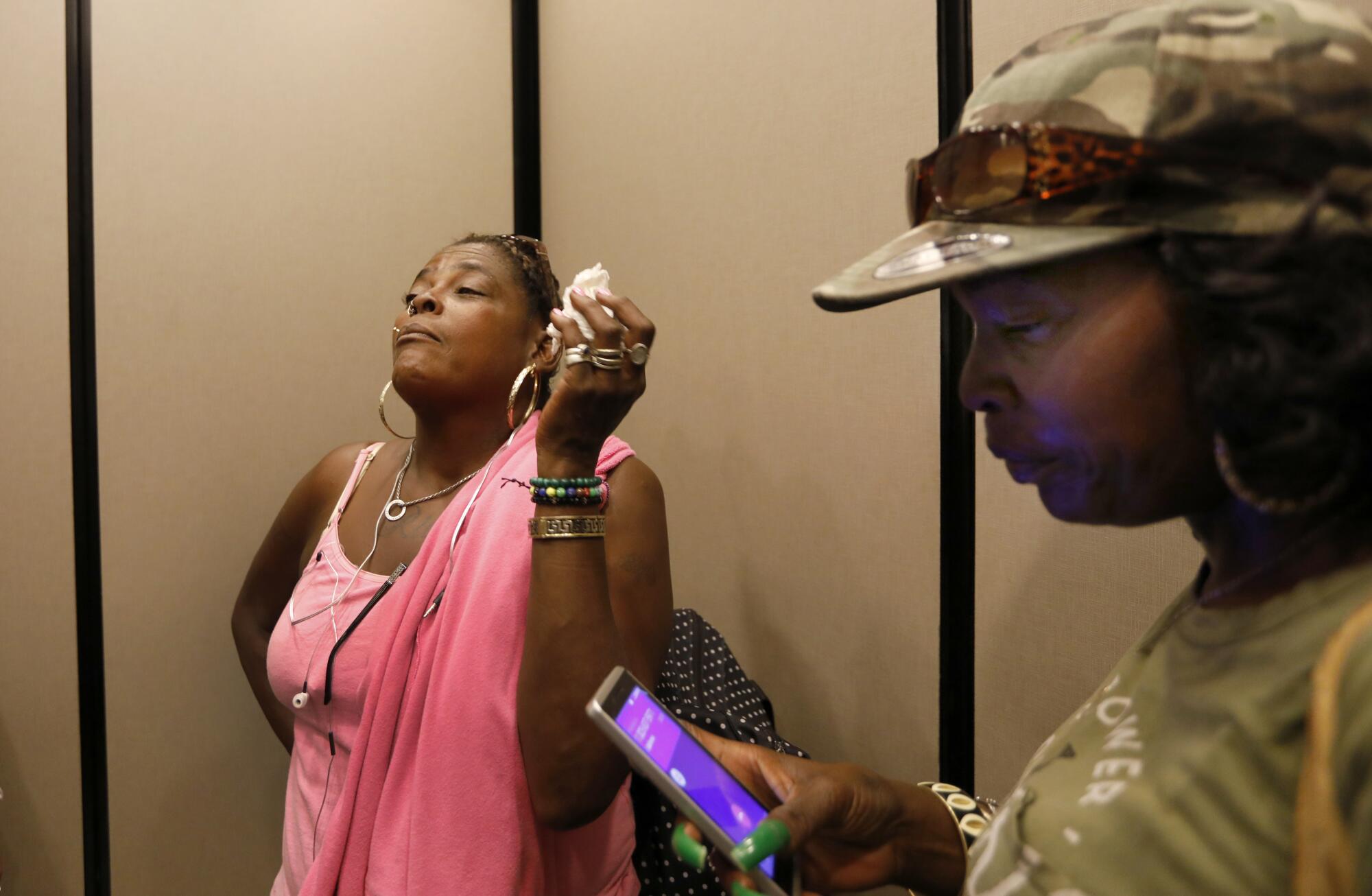
She rang her doorbell as if it belonged to someone else.
Then she took a breath, exhaled and pushed her key into the lock.
She opened the door. The room was dark, the blinds pulled shut. She raced across to let in the light.
“Ahhh,” she said. She waved her arms over her head.
Big Mama explored the kitchen, then the bedroom, then the bathroom. Everything around her smelled new: the untouched walls, the plump sofa, the wood cabinets in the kitchen. It was spare, but clean.
She started to unpack her bedding, then remembered: They still had to sign their leases. She turned to head out, but stopped.
She dropped to her knees. Light from a window poured in around her and reflected off the bare floor.
She clasped her hands on a coffee table and bowed her head. There was a lot to pray for.
The building manager had made the rules clear: No smoking. No visitors for longer than 14 days. No drugs, including marijuana (federal regulations prohibit the use of cannabis — even for medical reasons and even in states where it is legal — in any federal housing program like Section 8). Violations led to warnings, and three warnings could lead to eviction.
Tears on her face, she thanked God and asked for help.
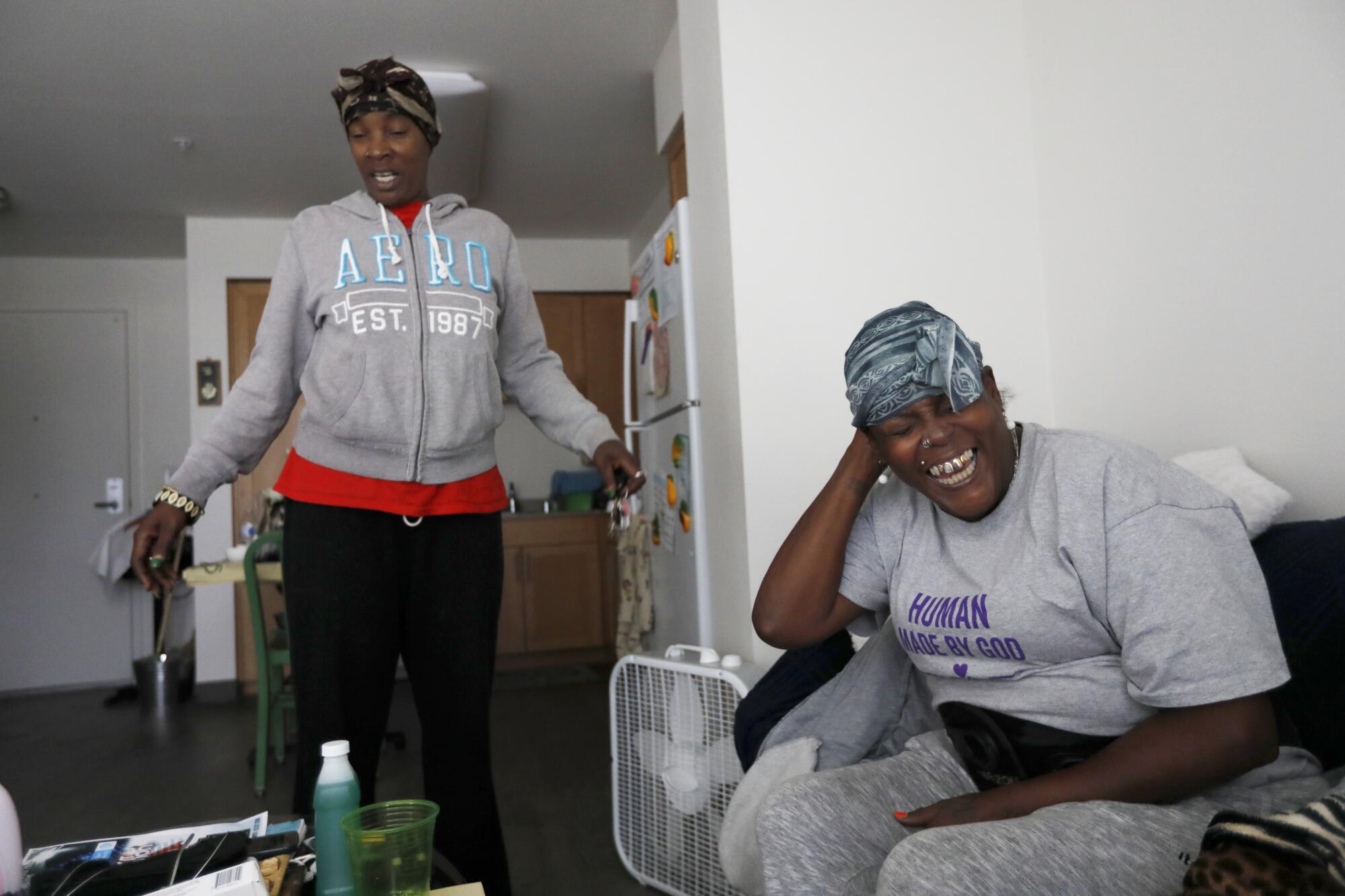
::
To make apartment living easier for Big Mama and her neighbors, the People Concern and another private agency, LifeSTEPS, were on site to provide counseling and other services. Their primary goal was to make sure no resident ended up on the street again.
After months, even years, of sleeping on the sidewalks, in tents or in cars, for some residents learning to live in an apartment was not as simple as unlocking a door and stepping inside. It meant living on someone else’s terms. It meant paying bills, cleaning, remembering their keys when they stepped out.
Leaving the streets also meant abandoning the past and imagining the future, which could be a challenge for anyone whose focus had been hour to hour.
To ease confusion and loneliness, residents invited friends over who were still homeless. Some found it hard to accept that they had been given housing and others had not. Guilt could sabotage good fortune, trigger old behaviors.
A visit could turn into an overnight, then a few days, then a few weeks, and weeks would lead to eviction. Visitors had nothing to lose by behaving badly. In their jealousy and envy, they didn’t care about lease agreements. Nor did they care that they were being watched to see if rules were being broken.
Residents were responsible not only for managing their visitors, but they also had to pay 30% of their income toward rent and utilities. Federal or county housing subsidies covered the balance, and for those whose sole income was general relief from the county — $221 a month — getting by week to week remained a problem.
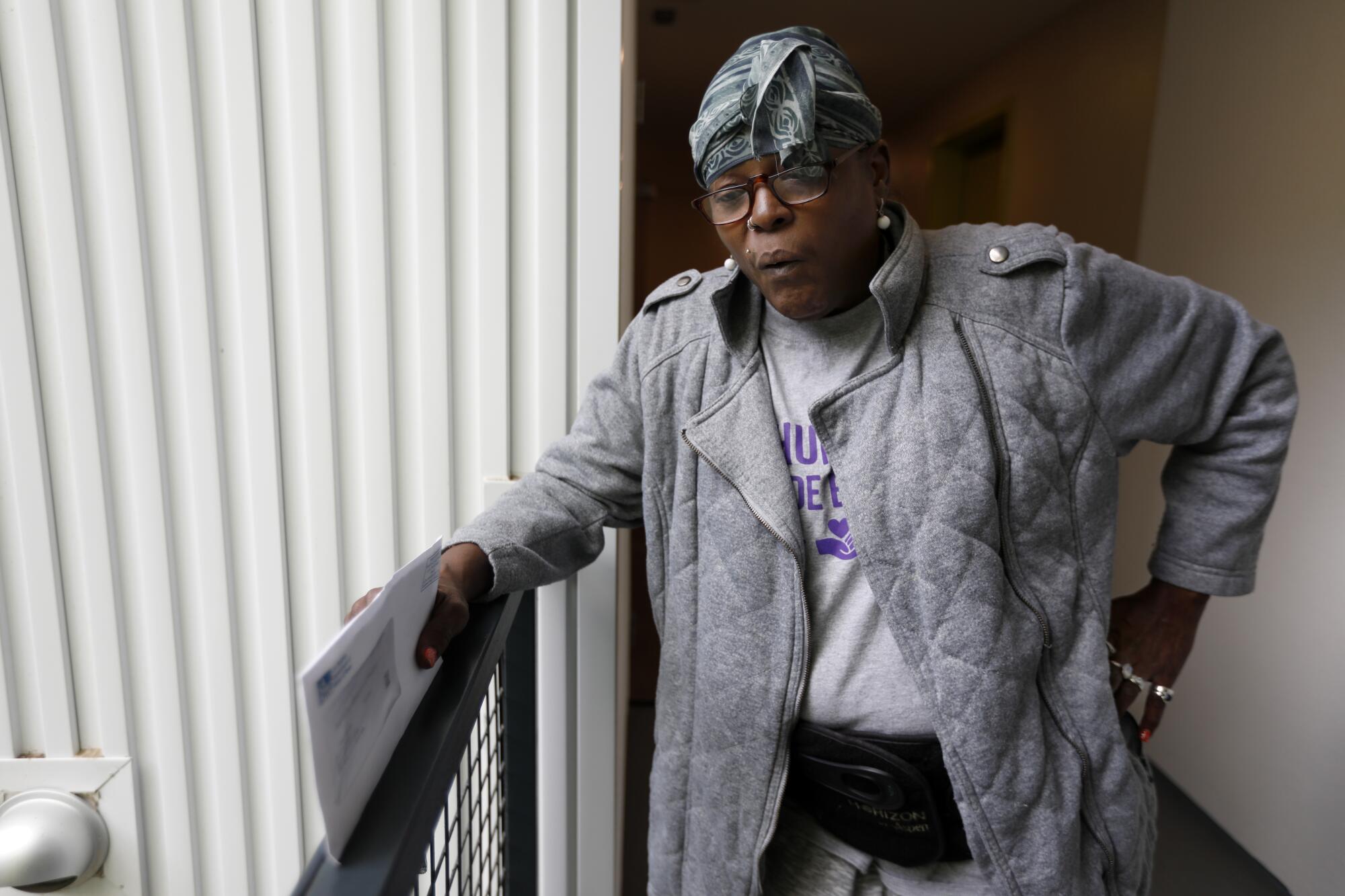
Food stamps paid for groceries, but for those unaccustomed to cooking, even eating fast food could add up. Some residents held back on purchases: a phone, new clothes, cleaning supplies. Getting around town on public transportation could be pricey, and paying for a car was nearly impossible.
And if residents found a job and their income increased, they would have to pay more for their apartment. As a result, some held off finding work — or, if they landed something, made sure they were paid under the table.
One young man took public transportation to Van Nuys to sell his blood plasma — five visits, $300 — to get through the month. One resident arranged with a supermarket in Venice a weekly donation of fruit, vegetables and expired packaged goods for the building.
Lurking beneath these struggles of life and routine were many unresolved causes of homelessness. New residents still had to fight addictions, heal illnesses, overcome trauma and look for jobs. They needed to think of themselves differently, no longer homeless, to find purpose and meaning in their lives lest boredom drive them into the streets again.
“Homelessness is like that car,” said Wendy, a vocational nurse who had lived on the street with Horace Lackey. Pointing to her aging Chrysler, she explained: “You can tow it, but you’ve got to open the hood to see why it’s not running.”
::

Two days after getting her key, Big Mama returned to Broadway Place to take down her tent and collect her recyclables. Turning the corner from the bus stop, she saw what remained of the encampment.
“Oh, no! Look what they’ve done!” she yelled.
In the short time she had been away, someone had slashed her tent and stolen her collection of aluminum cans. Soiled clothing, knotted plastic bags and fast-food containers were clogging the gutter. The sidewalk stank of sweat and spoiled food.
She had always worked so hard to keep it clean and her neighbors in line.
In a fury, she threw everything into the street, including her plastic chairs and blue milk crates. She yanked the cords that held up the tent. It started to droop.
“I wish I’d brought my lighter,” she said. “I would set this bitch on fire.”
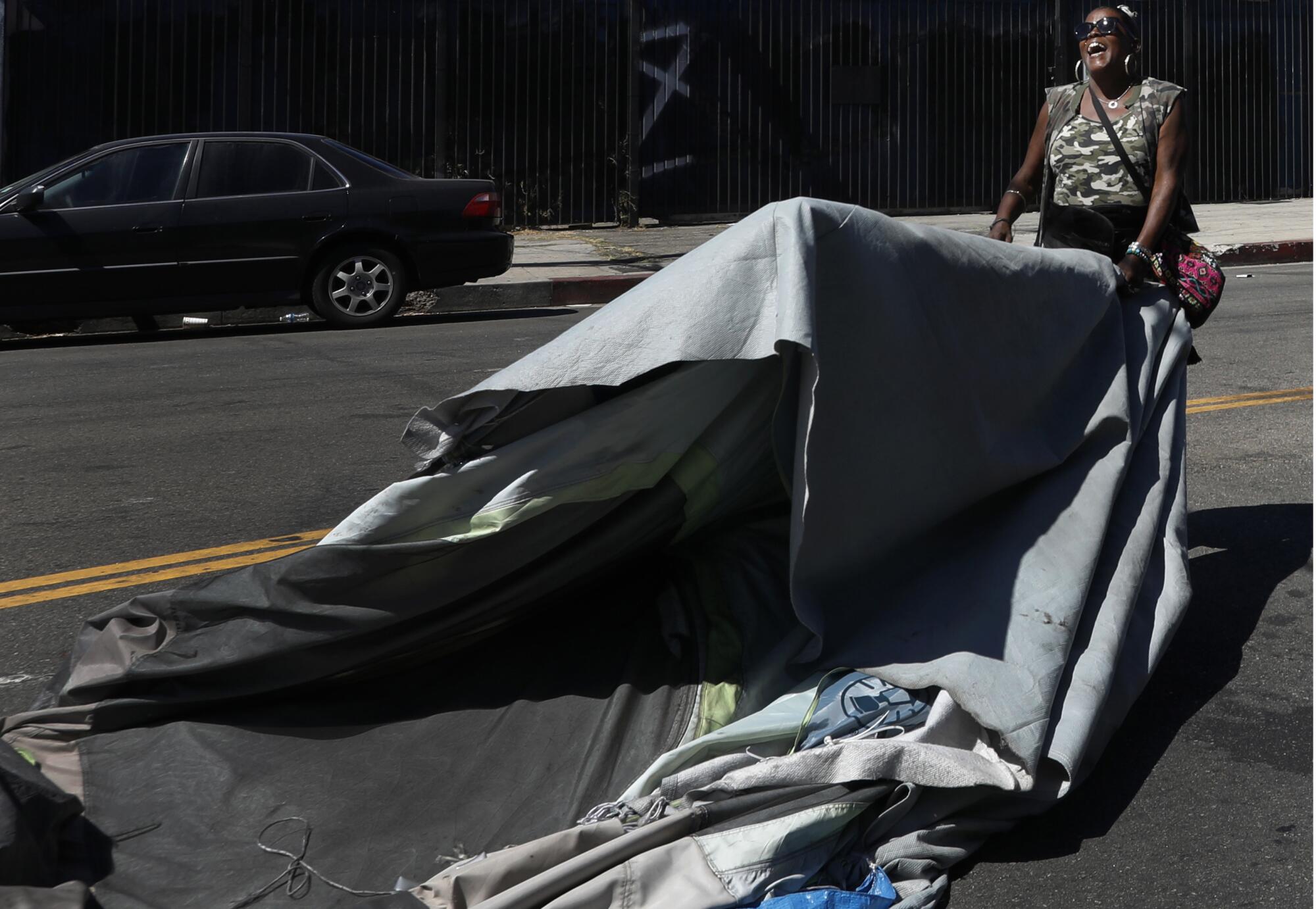
Stumbling over the folds of nylon, she grabbed a corner and dragged the flattened mess to a nearby dumpster. Then her mood lightened. She waved to a woman who ran a mini-mart across the street.
“I’m going home!” Big Mama shouted, over the passing traffic.
How did she like her new place?
“I love my apartment,” Big Mama said. “It’s cool, beautiful and quiet. It’s quiet as hell over there.”
She hurled a concrete block that had anchored her tent onto a nylon heap that had been Top Shelf’s tent. She took a final look at the few ragged tents that remained and turned away.

On her way home to her apartment, Big Mama stopped at a Numero Uno market and filled a cart. Talking to herself, she named everything she needed: juices, sodas, chips, chicken franks, cabbage, tortillas, corn bread mix, garlic and onion powder, ground beef, chopped steak.
“Can you get me some crab legs?” she asked a man behind a display case. “Can you steam them for me? Yes. And give me some big ones.”
At checkout, she handed the cashier a credit card, paying $178.10, money she had saved from her Social Security checks.
In her apartment, the air conditioning was blowing. She popped a Miller, cued up some music and started cooking dinner.
With Cornish hens in the oven, she melted butter for corn bread and stripped the stems off mustard greens that she would add to a turkey neck and onions boiling on the stove. Friends were coming for dinner.
As much as Big Mama wanted to celebrate getting off the street, she knew she had better keep a low profile and not draw attention to herself.
She had her apartment, but she could still be evicted.
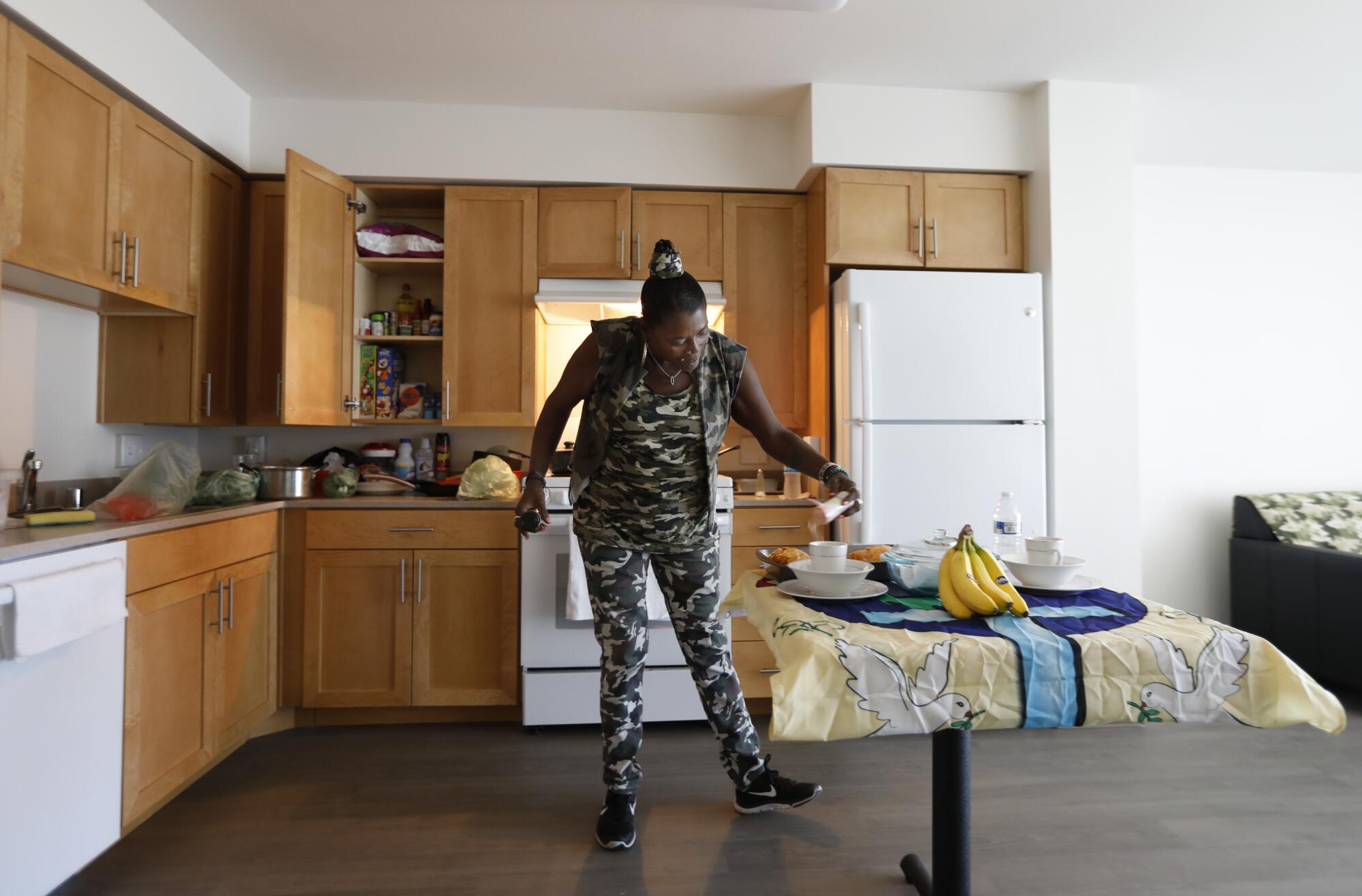
::
The first person to receive housing under Encampment to Home was the first to lose it.
James Flenoury had been living in a tent on 39th Street. He cleaned and waxed cars that belonged to local business owners and was usually in the company of Ruby, a pit bull puppy.
Flenoury was 71, lanky, with gray hair above his ears and a neatly trimmed goatee. He said he suffered from PTSD, failing memory, racing thoughts and anxiety. He said that he had served with an artillery unit in Vietnam, and later worked in Los Angeles reading meters and driving a bus.
Outreach workers had identified him as among the most vulnerable in the encampment. He needed help but would not be eligible for a unit in the new apartment buildings. He needed to be away from minors.
Flenoury was listed on the Megan’s Law website run by the California Department of Justice. It said he was convicted in 1986 of engaging in “lewd or lascivious acts with a child under 14.” He said he was innocent, but it caused a housing problem.
In June, his outreach workers found him a unit in a small complex near San Pedro and 92nd streets. It had 500 square feet, a bedroom with a bath, a living room and an adjacent kitchen.
Flenoury, who was pleased to be out of his tent and off the street, talked of getting a Persian rug.
Except for a folding chair, there was no furniture, which his homeless agency couldn’t purchase until the lease had been signed. Then there were delays, so he was sleeping on the floor, but it didn’t seem to bother him.
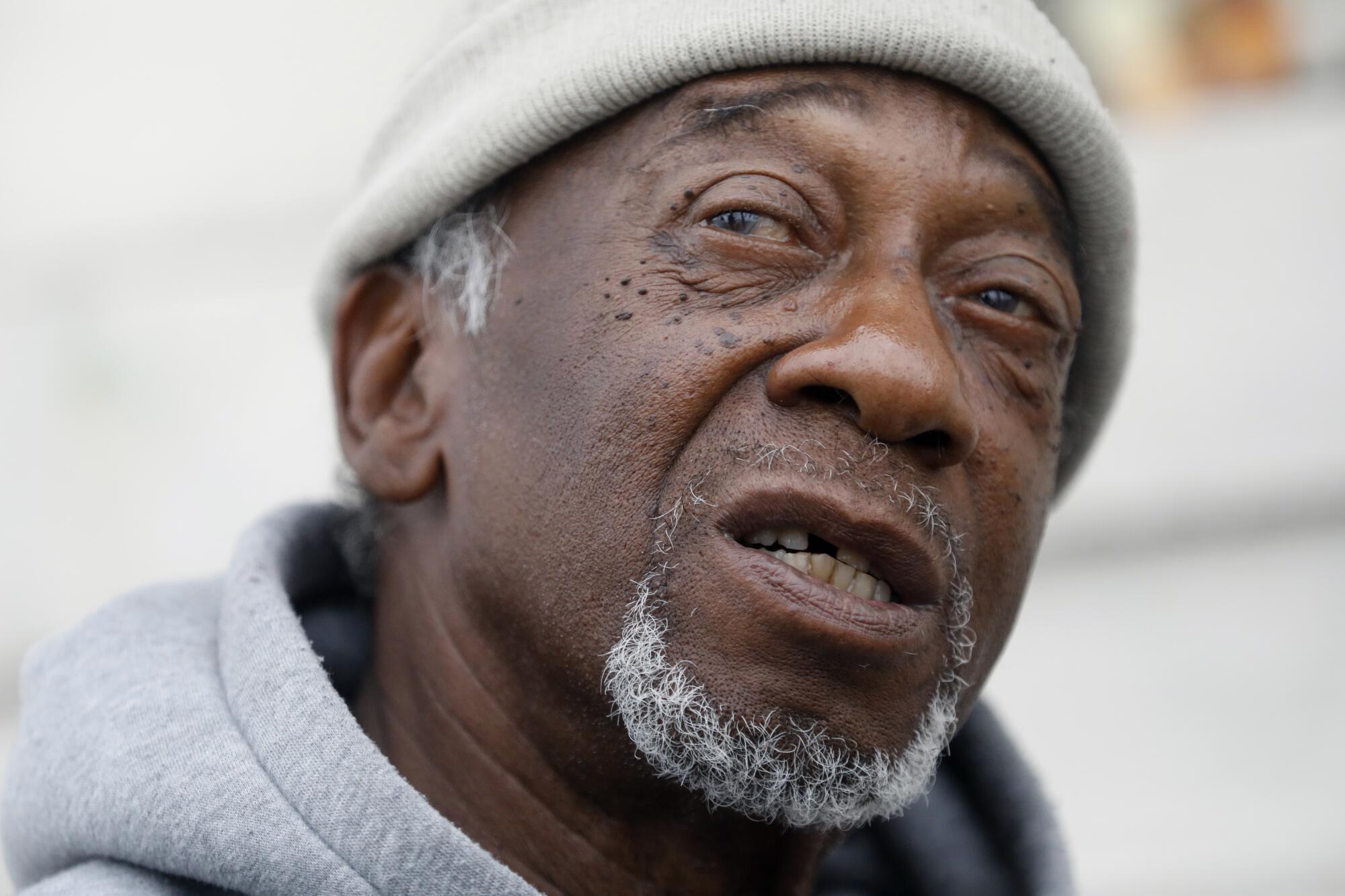
He hoped to set himself up as manager of the complex. “Whatever endeavor I put my mind to,” he said, “I can do it.”
For the first time since 2011, he was off the streets.
But within weeks of moving in, he began to break his rental agreement, according to one of the apartment owners who soon issued a “30-Day Notice to Vacate.” It listed nine violations, including drug use, unauthorized guests, vandalism and theft.
“Neighbors are in fear of their safety and belongings,” the co-owner wrote.
Flenoury contested the claim, and his case manager had tried to intervene and help him adjust to his apartment. But he couldn’t monitor his behavior every day. There was a fine line between being helpful and being intrusive.
Within days of receiving the letter, Flenoury was picked up by the LAPD and later convicted of failing to register with local law enforcement as a sex offender. He had gone from his new apartment to Men’s Central Jail.
He served 180 days, according to the Sheriff’s Department, and then was back on the street.
::
Two weeks after moving off the street, Leneace Pope was still settling in.
She liked her new home: the air conditioning, being able to shower, sleeping at night. “Being inside,” she said, “is more wonderful than being outside.”
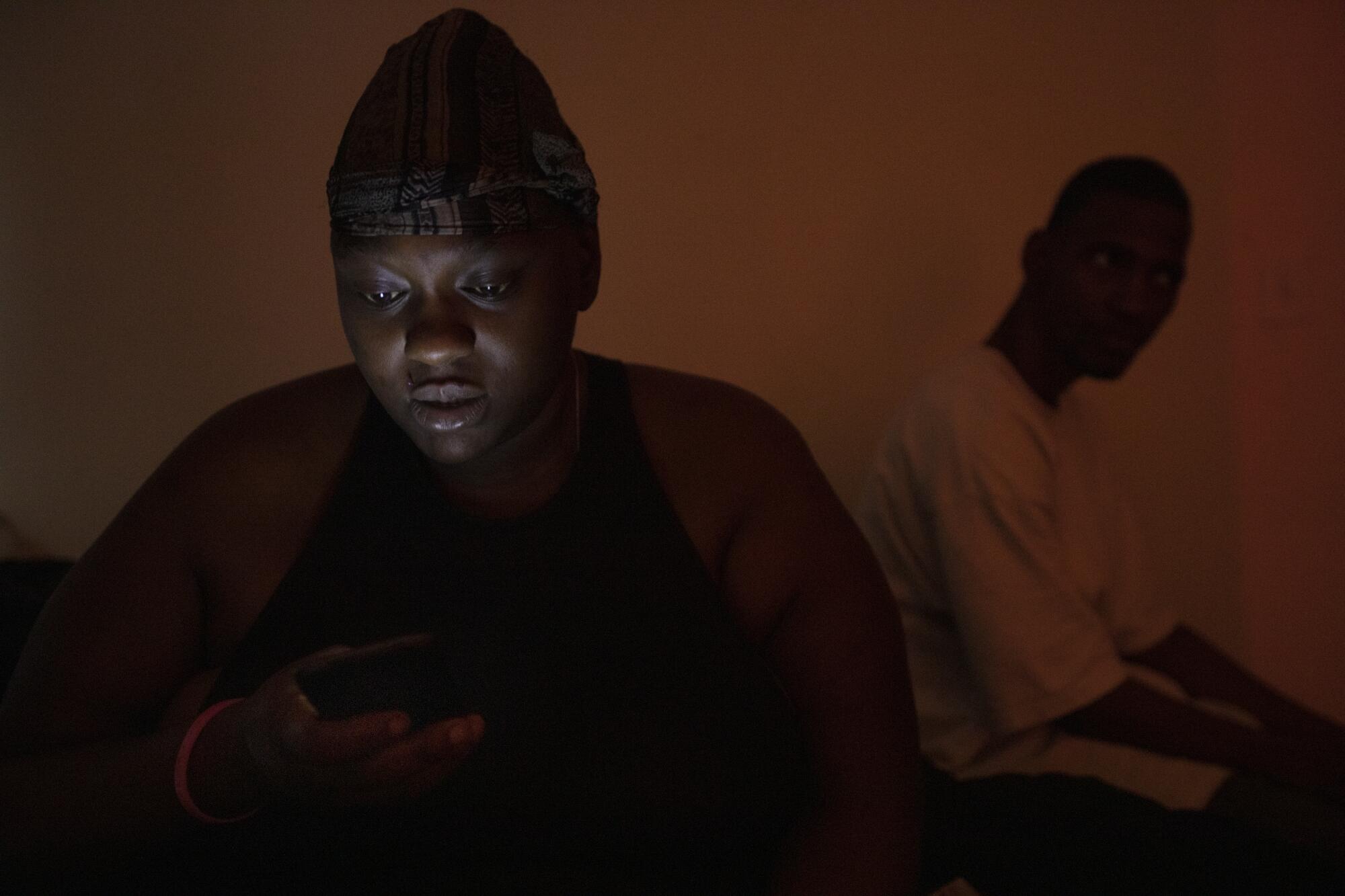
On a summer morning, she sat with her boyfriend on the couch. The blinds were pulled, giving the room a feeling of perpetual twilight. Two of her friends were there too. Niecy was aware of the rule that guests had to leave after 14 days, but she didn’t seem too concerned.
“We’ll see,” she said.
A week later, she had four more visitors, and the smell of marijuana wafted out of the bedroom where “Three’s Company” played on TV.
“Friends don’t like to be over there,” she said, referring to the encampment at Broadway Place. “So they come over here.”
Niecy, 34, sat at the kitchen table and colored. She treasured her pens and pencils, which she kept in a pack imprinted with a cartoon illustration from “Paw Patrol.” She seemed bored.
Her life was marked by broken relationships. She said she had been raised by her grandmother because her mother was an addict. She said she lost custody of her five children: the oldest 17, the youngest 4.
According to a report prepared by her social worker with the Department of Children and Family Services, Niecy had been cited for failing to protect the children in an abusive household, and the department rules that Niecy’s “substance abuse endangers the children’s physical safety.”
All of them, she said, were living with cousins or guardians.
“I miss having my babies around me,” she said.
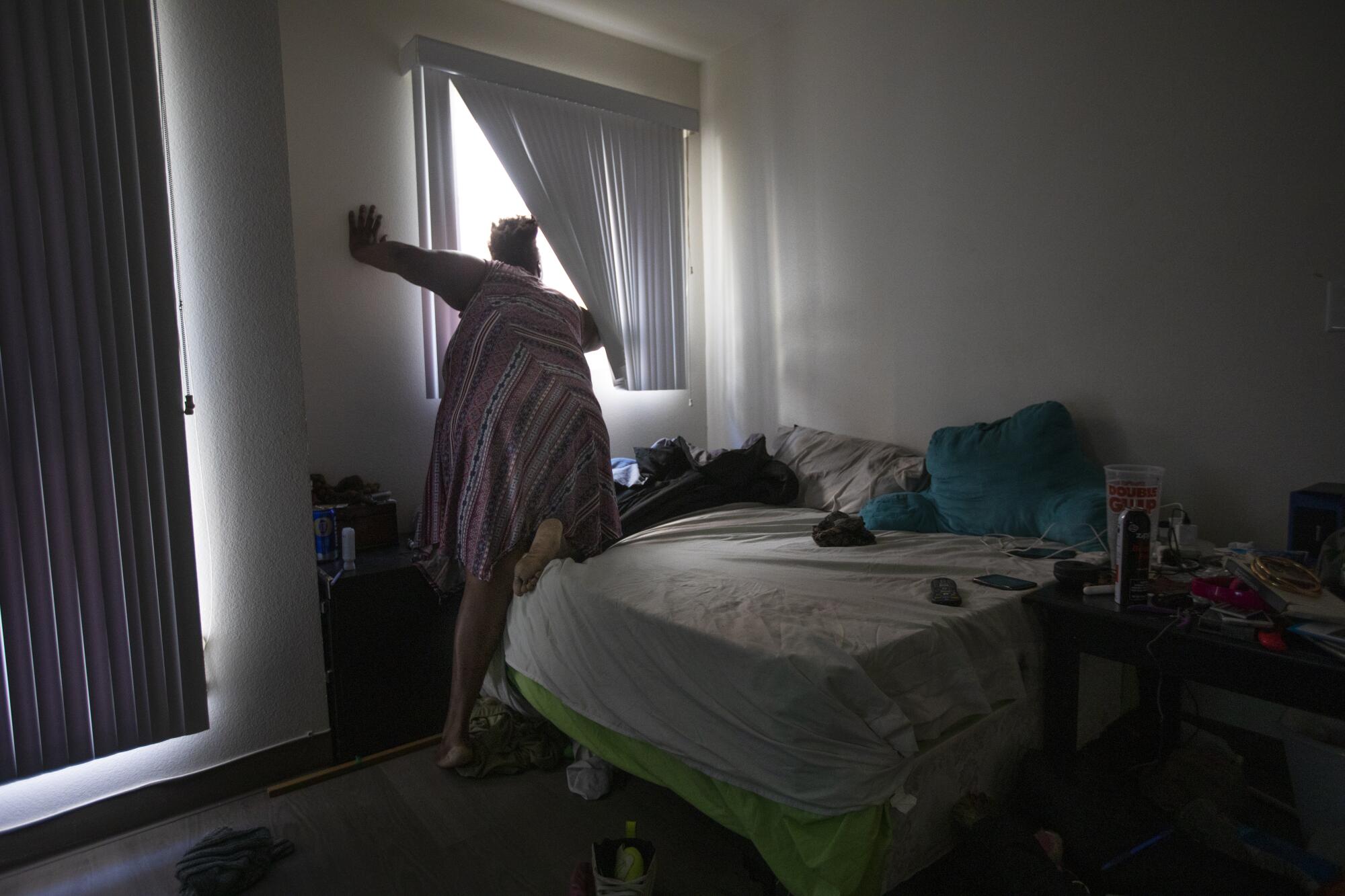
In mid-September, she met with Antoinette Monts, her case manager from the People Concern. Niecy struggled with her bills. General relief and food stamps were not enough. She earned a bit more styling hair and was trying to get work at a juice bar.
“I want to do nursing,” she told Monts. It was what her grandmother had done. “But that will take too long.”
“Don’t stop yourself,” Monts said. “It can be done if you want to do that.”
They set three goals: Get a primary care physician, build a better relationship with her children and improve her health.
Monts agreed to meet her in the exercise room that Friday.
Niecy didn’t show up. She said she wasn’t feeling well.
Her stream of visitors and overnight guests mounted. Still she was unconcerned.
“It’s better for me than to be by myself,” she said. “That’s scary.”
::
Melissa Vollbrecht knew the first community meeting would be contentious. They usually were. She climbed the stairs to the fourth floor and began ringing doorbells, trying to draw the residents out.
“Community meeting in 10 minutes,” she called out like a town crier. “Join us if you want.”
Young, energetic and slight, Vollbrecht had earned the nickname “Itty-Bitty” from Big Mama and Top Shelf. She was in charge of the on-site counselors, who were helping residents adjust to their new circumstances.
Three weeks had passed since the last tenant moved in, and the meeting was the first for everyone to gather and speak their minds. Vollbrecht had led these conversations at other buildings, and she knew the best strategy was just to listen.
Making the move from a tent to an apartment is never easy, and it varies for everyone. It depends upon individuals’ experiences on the streets and in life. Maybe they didn’t know what being a good neighbor meant. Maybe they never saw someone maintain a home.
They needed to be tolerant of behaviors, to understand that privacy is relative, walls are thin, and that there is fine line between keeping an eye out for one another and getting in one another’s business.
About 20 residents filled the community room. Sweet rolls and orange juice were laid out on a counter. Big Mama was there, as well as Top Shelf, who had brought her baby grandson.
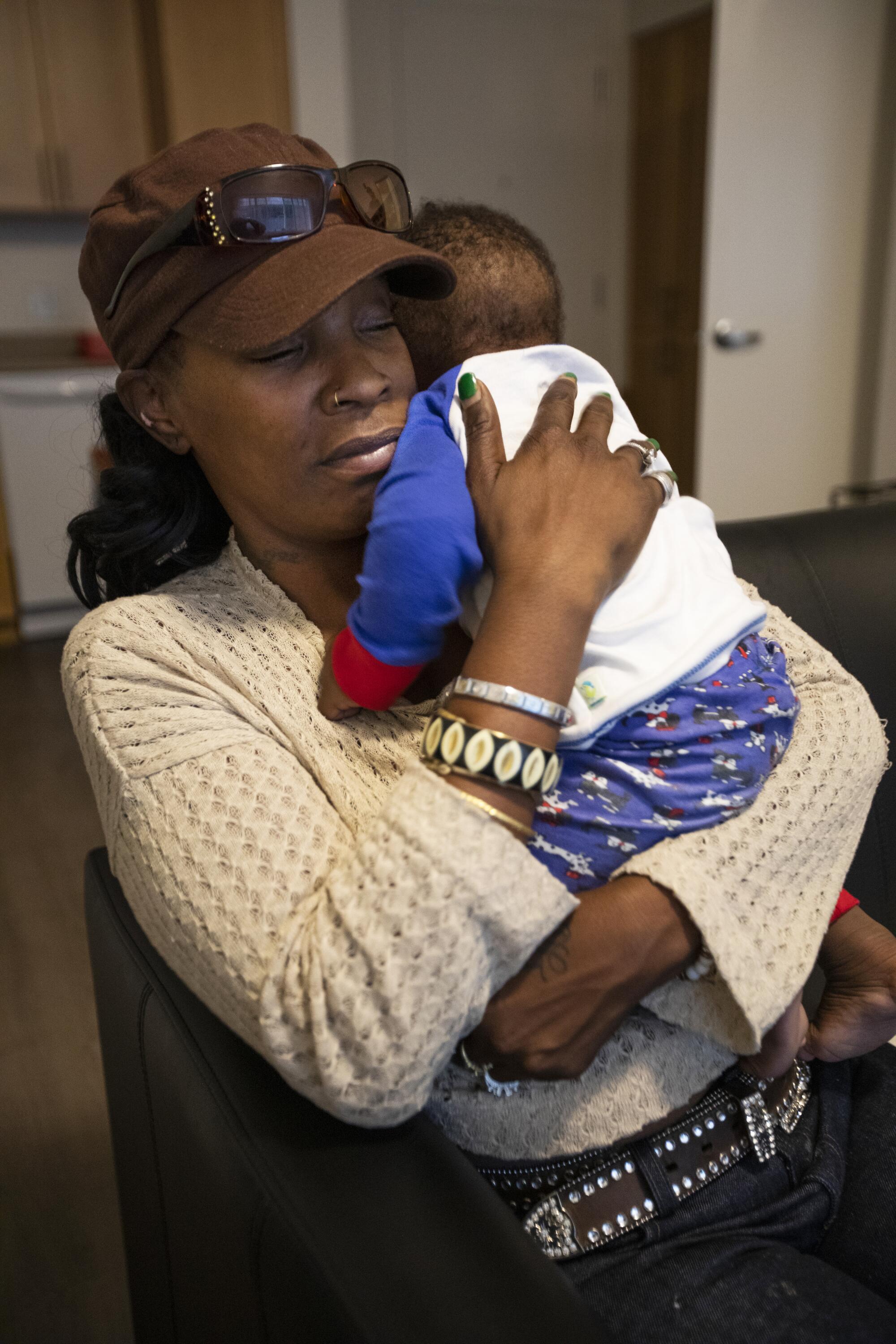
Some residents expressed concern about the disrespect neighbors were showing for their new home. People, they said, were urinating in stairwells, stubbing out cigarettes on the walls, spitting in the elevator and propping open outside doors to admit strangers.
“Enough is enough!” one said. “You’ve got to care about where you live.”
Others felt unsafe and frequently called the police to report suspicious activity, including battery and vandalism.
The north entrance, facing 127th Street, was especially problematic. The cul-de-sac was a dumping ground for old furniture and trash and was fronted with older apartment buildings, whose residents socialized through rolled-down windows with visitors who were double-parked.
”We need more cameras here,” a resident said. She threatened to call the police if she found anyone smoking marijuana.
In response to the mention of starting a neighborhood watch, Erin Hill, an on-site program manager with the People Concern, advised: Observing and reporting is fine, but please don’t engage. “We don’t want you to get drawn into the troubles of your neighbors.”
One man expressed his annoyance with litter: “I know we’re all walking a different path, but how long do we tolerate these situations? We don’t want to get dragged into a situation we’re trying to escape.”
One incident prompted a lengthy discussion.
There had been screaming and yelling shortly before dawn one Sunday from a resident who was sitting in his open doorway nearly naked. A neighbor called the police, and paramedics took the offender to a hospital.
“He was on drugs,” one resident said.
“We want to ask for your patience,” Hill said, as the conversation grew louder. “We are working with everyone.”
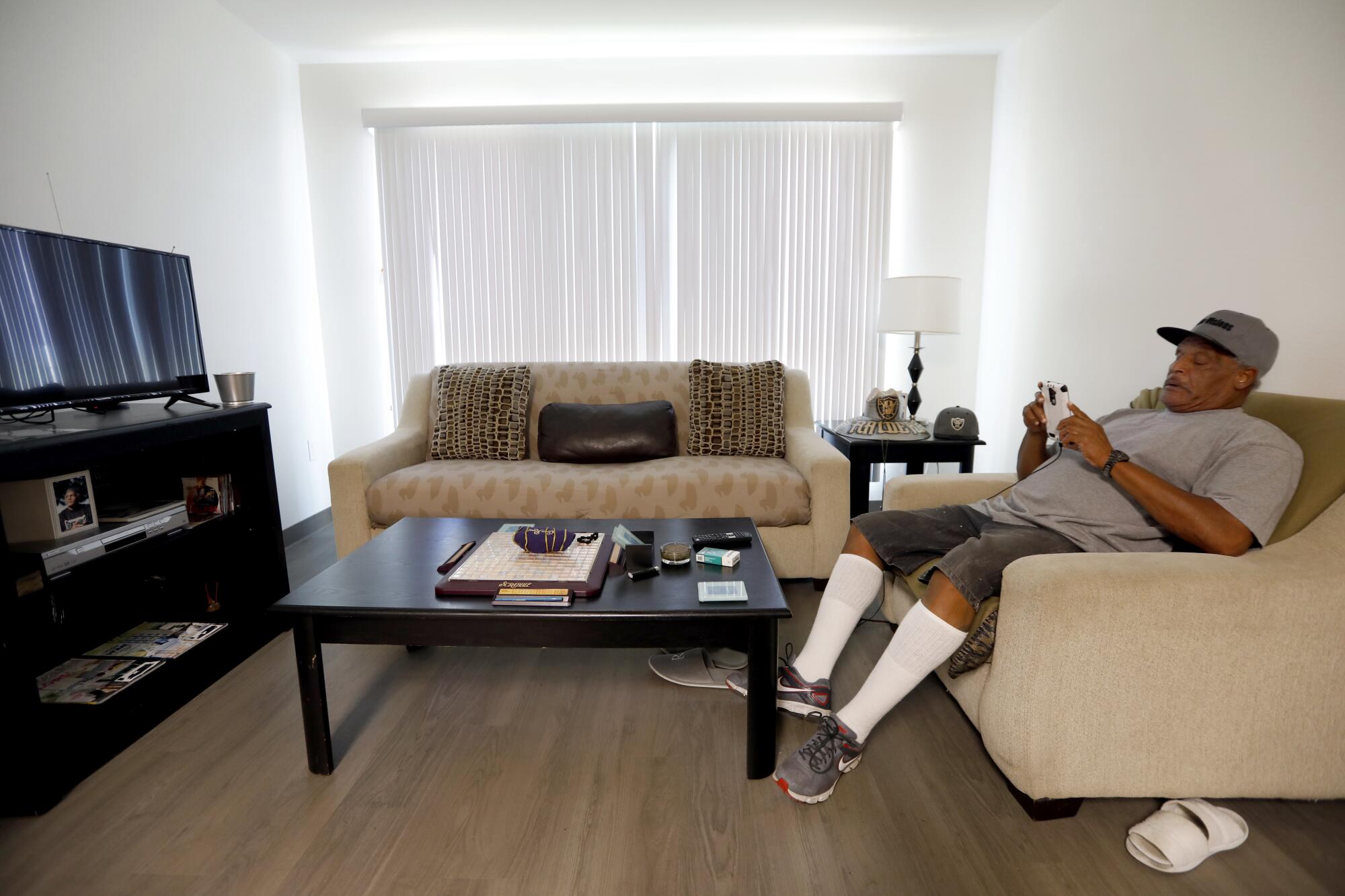
Another resident, Horace Lackey, urged the group to keep complaints to themselves. If their building got a reputation for trouble, he said, the police would be all over everyone.
“If you stay out of my business for six months, and I stay out of your business for six months,” Lackey said, “then what do you have? A year.”
“Everyone brings with them mental and physical issues,” Hill said. “This is a complex living environment. What is easy for you is difficult for others, and what is difficult for you is easy for them.”
In subsequent meetings — the second Thursday of each month — residents continued their complaints.
“It’s no better here,” said one resident, “than it was out there.”
More to Read
Sign up for Essential California
The most important California stories and recommendations in your inbox every morning.
You may occasionally receive promotional content from the Los Angeles Times.
